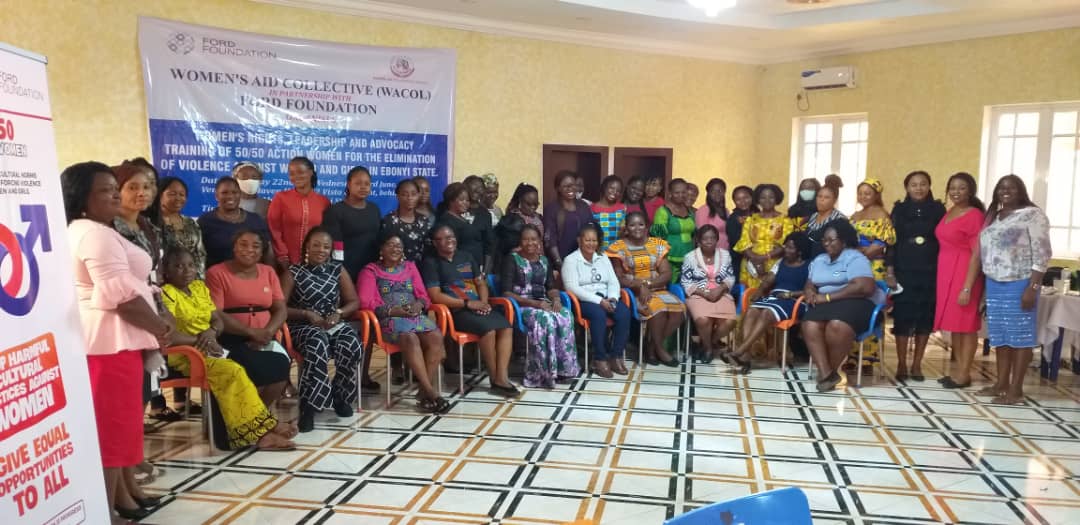Group, Women Aid Collective (WACOL), has taken steps to end violence against women and girls in Ebonyi and six other states.
WACOL in partnership with Ford Foundation, organised a 2-Day leadership and advocacy training of 50/50 action women for the elimination of violence against women and girls in Ebonyi state.
The training took place on Tuesday, June 22 and 23rd, 2021. At the end of the training, members of Ebonyi state 50/50 action women was inaugurated and charged with the responsibility of advocating for an end to violence against women and girls in Ebonyi communities.
In her opening remarks, the Founding Director of WACOL Foundation, Prof. Joy Ngozi Ezeilo, said they are carrying out the same project, in five eastern states and two southern states- Edo and Delta.
She was represented at the training by the Programme Officer, Ijeoma Uzoeshi.
The Director, noted that the objective of the meeting include; to strengthen the understanding of the participants on how VAWG reinforces gender inequality.
To also strategize on making demands from the government and policy makers on codifying laws and polices that will criminalize VAWG in all communities and promotor women inclusion in leadership, as well as to strategize on implementing the state of emergency declaration of the Governor’s forum on rape and against other sexual offences in the state.
She hinted that the team was in Ebonyi last March for a consultative stakeholders meeting to validate a research finding that they did in December 2020 and January 2021.
“In that research we selected some communities that cut across the three senatorial zones to understand what practices and norms that go on in our rural area. Those practices that reinforce violence against women and girls.
“After that research, we came out with a robust information about the peculiarities of different communities.
“In that consultative meeting, we wanted to do a validation and it was actually discovered that these things go on in our communities, especially as regards the area of women’s rights, issue of inheritance and so many cultural norms that still put women down, and still reinforce gender inequality.
“With that, we established that truly there is violence against women and girls in our communities. One of the issues that cut across all the seven states we went to was the issue of gender inequality as regards some cultural practices. Like the issue of inheritance. A lot of time, so many communities don’t give women the opportunity to get a share of inheritance in the places where they were born and the places where they were married to, and that is a way of putting them down economically.
“The issue of kola nut was a no go area in many places. We don’t even talk about it where women were not allowed to partake in the rituals of kola nut.
“Some of the reasons are unexplainable. While a woman will harvest the kola nut, sell it in the market but when it comes to presenting it a woman dare not. We had the issue of Female Genital Cutting, we know what women that were circumcised go through especially in the course of their reproductive health.
“We discovered other issues that will be discussed in the course of our presentation here. We said this issues need to end, especially in this era of development.
“We shouldn’t be going in that angle of still putting more than half of the majority of our population down just because of norms and practices that are detrimental to development. And that is one of the reasons why we are here.
“We have selected 50 women and that is also happening across the project states. We call these women the 50/50 action women. They are going to take up this challenge, they are going to help us because this has to do with all of us. Even if you are not involved, as long as one person is still going through this violence all of us are going through it.
“We are hoping that we are going to codify some of these laws to actually look at those ones that are good and uphold them, for those ones that are not good we find a way to review them, pay strong worded advocacies to our traditional leaders in our different communities.
“We are hoping that before the end of this project, we will have communities that have bye-laws because the reason some of these things are going on is because we don’t have laws that we can use to get justice for victims.
“Most of these cultures are not written down anywhere, so you don’t even find them to know how to go about it when a woman’s right is violated. So we are hoping that communities have bye-laws, we are going to encourage them and support them to have bye-laws so that women can hold on to some of these documents. Also, in line with some of other instruments we have, to seek for justice and to ensure that some of these barbaric norms and practices end in our communities. We know that when they end, all these violence have ended,” she stated.
In their goodwill messages, the representatives of ministries of Chieftaincy Matters, Women and Gender Affairs, and Justice, assured they will put into practice the lessons from the training.
One of the resource persons, Mrs.Ugo Nnachi, took the participants on Women Right issues and Women’s Transformational Leadership for realization of women’s rights.
While Barr. Helen Kalu, took the women on role/mandate of women fifty-fifty Advocacy group. Barr. Portia Chigbu, spoke on violence against women and girls in Nigeria.

